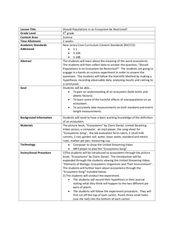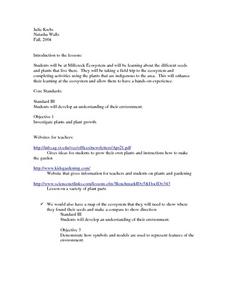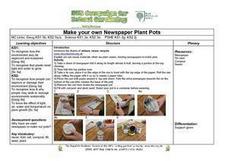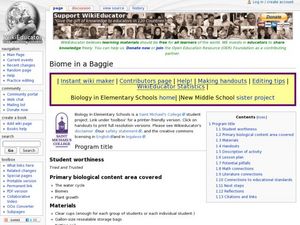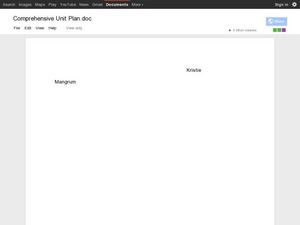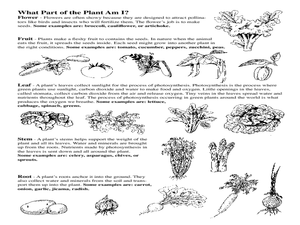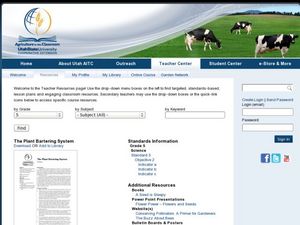Curated OER
Should Populations in an Ecosystem be Restricted?
Fourth graders experiment to determine how overpopulation effects ecosystems specifically plants. In this ecosystem lesson, 4th graders conduct an ecosystems experiment after listening to Claire Daniel's, Ecosystems. They watch a video,...
Curated OER
A Field of Beans
Beans, or legumes as they are sometimes called, are the topic for an integrated multi-subject lesson. Youngsters will read, write, observe, and research everything there is to know about beans. They read a bean story, conduct a bean...
Curated OER
Pumpkins . . . Not Just Part of Halloween
Students study the pumpkin. In this pumpkin lesson, students participate in different activities that explain the history of pumpkins and how pumpkins develop and grow, read "The Great Pumpkin Story" and answer comprehensive questions...
Curated OER
Ecosystem Field Trip
Students investigate the different seeds and plants that are part of the Millcreek ecosystem. They take a field trip to the ecosystem and complete activities using the plants that are indigenous to the area.
Curated OER
This Can't be a Plant
Students grow mold. In this science experiment lesson plan, students grow mold on different pieces of bread by adjusting the moisture, temperature, and light. They record the results to see which grows the most mold.
Curated OER
Profit From Pumpkins
Third graders cut open a pumpkin. In this math lesson, 3rd graders complete the worksheet "From Seed to Pumpkin" and then clean out their pumpkins to see how many seeds are in it.
Curated OER
Wiggley Worms
Learners investigate how worms affect plant growth. In this biology activity, students construct a worm ecosystem in a plastic 2 liter bottle and plant a seed in the soil. They later compare the ecosystems with worms to ones...
Curated OER
Rice Farming in Texas
Third graders explore how rice farming came to Texas. In this rice farming lesson, 3rd graders discover the history of how farmers began to grow rice in the United States. Students color code maps and create a timeline for rice farming...
Curated OER
Succession in a Jar
In this succession worksheet, learners build an ecosystem using a jar, water, bird seed, soil and a water plant. They predict what their ecosystem will look like in 3 weeks and draw a diagram. Students record their data over the course...
Curated OER
Make Your Own Newspaper Plant Pots
Students make plant pots out of newspaper as part of a recycle, reuse, and reduce lesson. In this recycling lesson, students fold a piece of newspaper to make a pot in which to start plants. They fill it with compost and plant seeds.
Curated OER
Oklahoma Grown: Discovering Oklahoma's Agriculture
Fourth graders investigate where Oklahoma's variety of crops are harvested, and grown their own plants. A printable map and crop information guide are provided.
Curated OER
Biomes and the water cycle
Students create a desert biome and a prairie biome and see how plants survive in both. In this biomes lesson plan, studnets create their biomes and see how the water cycle effect each biome and plant differently.
Curated OER
The Life Cycle of the Mealworm
Fourth graders provide a habitat for live mealworms and observe their life cycle. In this animal life cycle and scientific inquiry activity, 4th graders create a habitat for a live mealworm and observe and record related data as it...
Curated OER
Fruit or Vegetable?
Watermelon is a vegetable? A tomato is a fruit? Believe it or not, this debate is decades old. Groups examine rulings by the US Supreme Court, the USDA, and state statutes before developing their own criteria to use when labeling...
Curated OER
Lesson 12: Ho'olaulima: Let's Make a Hawaiian Garden
Second graders grow a classroom garden that acts as a living laboratory for cross-curricular activities. In this classroom garden lesson, 2nd graders follow directions to build and plant a garden that is used to teach math, science, and...
Curated OER
Little Sprout
Pupils plant seeds. In this producers lesson, students compare plants and list what they have in common. They discuss what plants need in order to grow. Pupils then plant seeds and observe them as they grow.
Curated OER
Plant Party
Young scholars identify plant parts. In this plants lesson, students bring in a vegetable. Each student classifies which part of the plant their vegetable comes from (flower, root, ect.) Young scholars identify the parts of their...
Curated OER
Herb is the Word
Pupils conduct an experiment to determine how different soils affect plant growth over a six-week period. After determining the physical properties of different types of soil, students plant various types of seeds into the soil samples....
Curated OER
The Plant Bartering System
Fifth graders explore plant characteristics by viewing a flower and seed presentation. In this environmental adaptation lesson, 5th graders identify specific traits plants have in order to allow them to grow in different climates whether...
Curated OER
Prairie In A Bottle
Second graders observe images of prairie ecosystems and discuss the needs of living things. They create a prairie habitat in a closed jar to observe the water cycle and plant growth.
Curated OER
Sunflowers (Grades 3-8)
Students examine sunflowers and discuss the importance of sunflower cooking oil and seeds. They view pictures, read books, sing sunflower songs, and grow flowers from sunflower seeds.
Curated OER
If It Smells Good, Is Edible, and Attracts Wildlife, Then It's a Practical Garden
Students explore landscape design. In this practical gardening lesson, students design landscape plans that call for shrubs, trees, and plants that can be used for aesthetics, cooking, and wildlife.
Curated OER
Taking Care of Nature (Religious)
Students discover how they can help care for the earth. In this environmental protection lesson plan, students discuss how God created the earth and what will happen if they fail to care for the earth properly. Students grow their own...
Curated OER
Farmers and the Food Connection
Students investigate the process of growing food. In this agricultural lesson, students invite a farmer into their classroom to discuss how they grow and process food. Students participate in learning centers which focus on farming.
